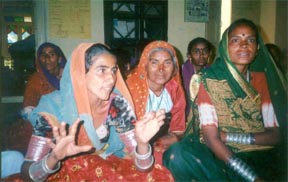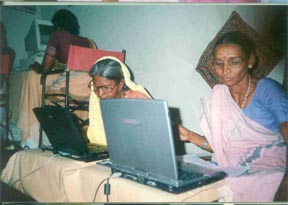Feb 05, 2026
Feb 05, 2026
by Malvika Kaul
 A woman vegetable vendor recently used a cell phone and called Indian President A P J Abdul Kalam on his mobile. The President was only a few feet away from her and the cell phone she used was borrowed. But it was a special day for her and thousands like her: the launch of the Thaili (pouch) Phone Program of the Self Employed Women's Association (SEWA).
A woman vegetable vendor recently used a cell phone and called Indian President A P J Abdul Kalam on his mobile. The President was only a few feet away from her and the cell phone she used was borrowed. But it was a special day for her and thousands like her: the launch of the Thaili (pouch) Phone Program of the Self Employed Women's Association (SEWA).
SEWA members - vegetable vendors, tobacco workers, gum collectors and village artisans - will now keep their cell phones in these beautifully handcrafted cloth pouches hanging from the wrist or tucked into their sari-clad waist.
For the vegetable vendor, this was the first brush not only with the country's President, but also with technology. Just a few days earlier, SEWA - a Gujarat-based organization of 500,000 urban and rural poor women - had taught her to use the cell phone. She now plans to buy her own mobile phone. "I will use it to get the latest rate of vegetables in the market. I can earn more by being connected with the market," she declared.
At SEWA's headquarters in Ahmedabad, President Kalam also inaugurated the Computer Learning Centre called Vignan SEWA (school for science and technology). The program aims to train over 12,000 women in the next three years in ICT (Information Communication Technology). Already, several slum and village women in Gujarat are learning to communicate through satellite conferences and video filming.
 Computers, cell phones, teleconferences via satellite stations? Do women who barely manage to get two square meals need information technology? Can illiterate women even use technology? "In the last two years, women have come a long way - from considering PCs to be machines that give electric shocks or as fancy toys meant for the privileged," says Manisha Patel from SEWA's ICT team. "They have a vision. They understand that all these tools in some way or the other link them to the big multi-layered world of enterprise and profits."
Computers, cell phones, teleconferences via satellite stations? Do women who barely manage to get two square meals need information technology? Can illiterate women even use technology? "In the last two years, women have come a long way - from considering PCs to be machines that give electric shocks or as fancy toys meant for the privileged," says Manisha Patel from SEWA's ICT team. "They have a vision. They understand that all these tools in some way or the other link them to the big multi-layered world of enterprise and profits."
Jebunissa, a Muslim farmer in Gujarat's Rawanpura village, sells her exquisitely embroidered pieces through SEWA. She says: "Two years ago when I saw a computer for the first time, it was magic. I saw how you could make designs and save them on the computer and send them for approval on email. The computer is like a window to the world. I told my husband I would learn how to use a computer."
Rawanpura has been suffering from drought for the last three years. Her family's future hangs on her embroidery threads. For a higher income, she has to increase her productivity, be faster and better.
Jebunissa doesn't know English and until two years ago she hadn't stepped out of her home. But after a week's training, she's learned how to make her designs on the computer and work on an Excel sheet. "I feel less helpless today. I feel I am part of the new world," she says.
For several women like Jebunissa, ICT offers a route to a better life. The invisible unorganized labor sector, which runs 92 per cent of the Indian economy, has 97 per cent women, mostly agricultural workers, artisans, loaders, vegetable sellers, sand pickers, gum collectors, rice mill workers and tailors. Over 46 per cent of them are casual workers and about 36 per cent are unpaid for the tasks they perform.
While liberalization and globalization have fetched huge profits for some, the women who earn 25 per cent of the national income have been kept out of the long chain of global markets. The Indian embroidered dress at the New York store which sells for US $100 only pays Rs 10 ($US1=Rs 47) to the woman artisan for her craft. Globalization has only increased women workers' vulnerabilities in an already exploitative market.
But can ICTs change things for her? "Globalization cannot be reversed. But the women can surely be prepared to voice their demands and desires," says Reema Nanavaty, director of Rural Development in SEWA. "If multinationals can use ICT to increase profits and expand markets, poor women can use the same tools to upgrade their skills and organize themselves to be part of the global market." Instead of letting women become passive victims of global markets, SEWA's program aims to enable women as negotiators.
It was after the 2001 earthquake in Kutch district, Gujarat, that women saw the obvious advantages of dish antennae and tele-centers. SEWA's teleconferences, relayed to 11 districts of Gujarat, brought Kutchi women face-to-face with government officials - demanding why relief had not reached their villages; why water supply had not been restored; or how many rehabilitation schemes were available.
Nanavaty describes how a telephone can change the mindset of a village woman. "One day I got a telephone call on my cell phone from a woman in a village. She announced that she and three other women had pooled in to buy a (landline) phone. They could now ring the bus terminus to check departure timings instead of waiting on the highway for hours," says Nanavaty. "They could also confirm appointments. One call costs them Rs 2. But a useless trip costs them a day's wages (Rs 20)."
The women's desire to educate themselves has increased - many now want to learn English, even before they have learned to read or write Gujarati. They realize that many of the things they use - whether medicine or something else - displays information in English.
Leela Dantani used to sell vegetables. She now heads the video section of SEWA. When she jumped on the ICT highway, learning did not come easy to her. She couldn't read the symbols or instructions on the camera or follow these on the editing table. Slowly, she found a way. "I memorized the symbols and colors on each camera set or recording system. But soon I realized that with each model, the symbols were different. I could only operate the SEWA audio system. So I learnt the English alphabet too. Now I travel across the country to teach other village women."
Her films capture problems women workers face, and help influence the authorities. Some have also been used in court battles as proof.
Pushpa Parmar, a weaver from Rawanpura village, gives computer training to rural women. Illiteracy has never been a barrier, she says. She has created a Gujarati-English computer manual for women: "I thought of words and symbols that women would understand and remember easily. They are so eager to learn that I don't have to repeat my lessons."
However, the most crucial change in women's lives - potentially - is political in nature. Waliben from Garuda village said she would like to use the knowledge on local governance - gained from teleconferences - to contest the sarpanch (village council head) elections. "That's when the situation of the entire village will change." She sees politics not just as an election process but as one that makes governance accountable.
15-Jun-2003
More by : Malvika Kaul